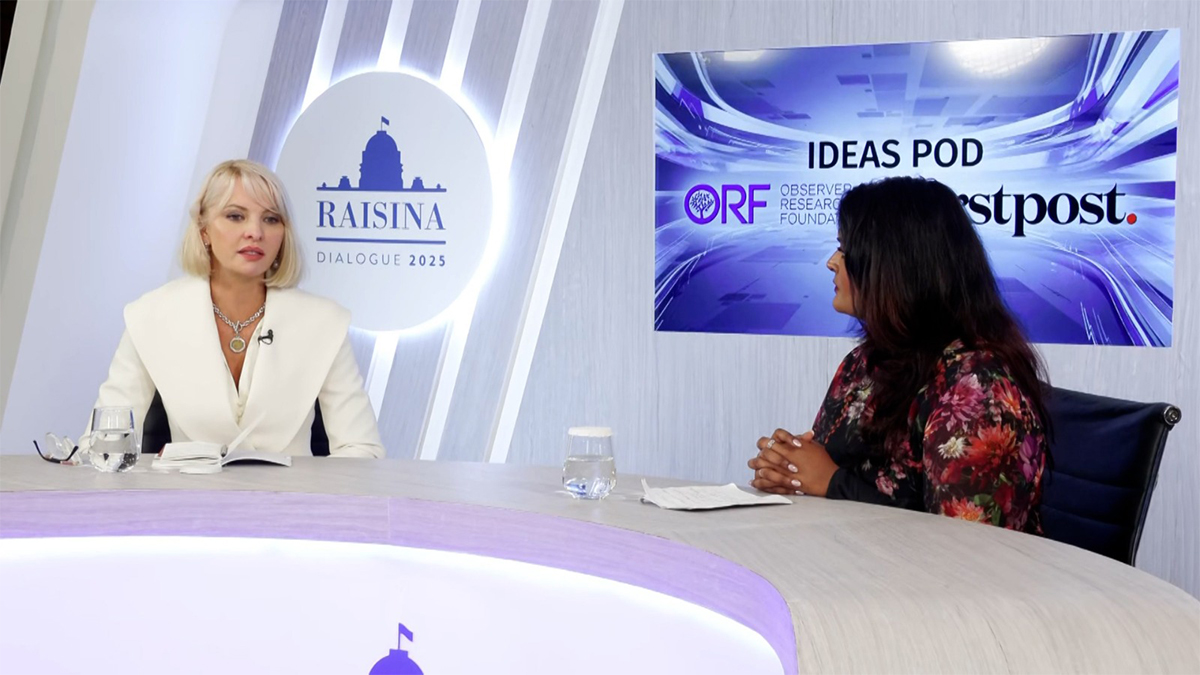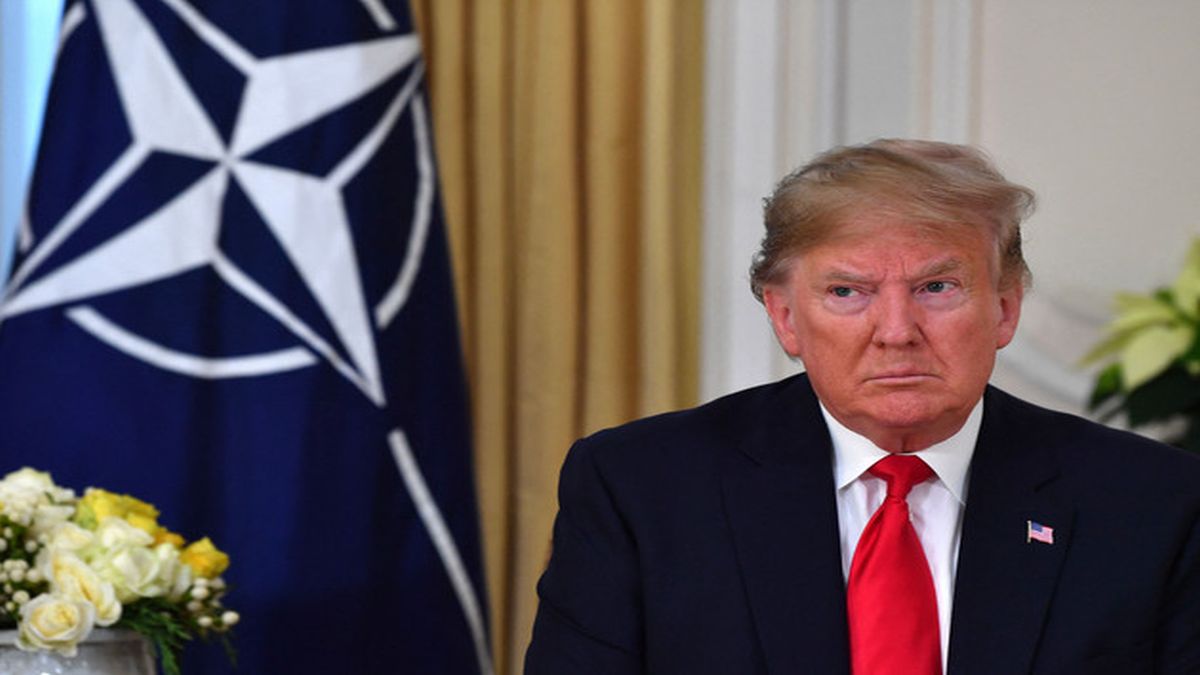The October 7 attacks by Palestinian armed group Hamas on Israel in 2023 is viewed as a watershed in the long-standing West Asia crisis over the status of Palestine. But many ask, did the conflict actually start with October 7 attacks that killed over 1,100 people? Is Israel chasing a realistic goal of finishing Hamas?
“What is not being addressed is the real cause behind the whole thing. The conflict did not start from October 7. The thing started 70 years ago with the occupation of Palestine,” said Abla Abdel-Latif, the executive director and director of research at the Egyptian Centre for Economic Studies, on the sidelines of the Raisina Dialogue, the forum for annual discussion on burning geopolitical and geo-economic issues.
Latif was in New Delhi to participate in the event hosted by the Observer Research Foundation (ORF) in partnership with the Ministry of External Affairs (MEA). Responding to the resumption of military strikes by Israel on Gaza, she said West Asia “is in the middle of the crisis now that Israel has ended the brief ceasefire”.
Latif told Firstpost that it is not a realistic goal to completely get rid of Hamas. “This will only prolong the war.”
“A two-state solution is the ultimate way of reaching any sort of reconciliation,” she said.
Latif argued that “political reconciliation needs to come first before anything else”. She mentioned political resolution in the conflict should be based on three principles — 1) Palestinians have the right to the land, 2) push for a two-state solution, and 3) there’s is no such thing as overtaking Gaza.
She mentioned that the ongoing conflict “is being looked at Israel and Hamas are two equal sides, which is not the case”. While speaking to Firstpost after the panel discussion, titled “Beyond the Crises: Prospects for Peace and Progress in the Middle East”, Latif insisted that the region should pay more attention to the recovery and reconstruction of Gaza plan proposed by Egypt.
The ongoing Israel-Hamas war and hopes for a ceasefire in Gaza were the key talking points at the panel discussion, held on the third day of Raisina Dialogue 2025.
The discussion revolved around the stark contrast between the region’s potential for economic transformation and persistent conflicts between its key actors. The panel comprised: General David Petraeus, Partner, KKR & Chairman, KKR Global Institute, United States of America; Eden Bar Tal, Director General, Ministry of Foreign Affairs, Israel; Abla Abdel-Latif, Executive Director and Director of Research, Egyptian Centre for Economic Studies, Egypt; Rainer Rudolph, Vice-Chairman, Munich Security Conference, Germany; Oana Popescu Zamfir, Director, GlobalFocus Center, Romania.
The experts overseeing the topic spoke about Israel’s strategy in the war, the human cost and the economic implications of a wider West Asia crisis, the role of the European Union in conflict resolution and the change in the US strategy after January 20 when US President Donald Trump came back to the White House.
Israel’s strategy in the war
While speaking on Israel’s military strategy in West Asia, General Petraeus admitted that October 7 was a “ major military and intelligence failure for Israel”. However, he hailed Israel’s “dynamic” operation in Hezbollah and its frequent clashes with Iran, insisting that it helped in ensuring security in the wider region.
Gen. Petraeus noted that Israel’s operation in Gaza and control over the Philadelphi Corridor prevented Iran from sending weapons to Hamas militants. He also mentioned that while the recent change in the Syrian regime is by “no means consolidated” it prevents Iran from arming Hezbollah. He also mentioned that, with the overthrow of former Syrian President Bashar-al-Assad regime, “Iran cannot use the route it had to supply weapons to Hezbollah”.
When giving his take on the hopes for a permanent ceasefire between Israel and Hamas, the General said: “I would love to see it end but you will have to achieve the objective to end it.” He insisted that Israel should focus on the country’s Prime Minister Benjamin Netanyahu’s three objectives, i.e. destroying Hamas, keeping Hamas from governing and bringing the hostage back.
He went on to propose a fourth objective which is to “provide better life to the Palestinians without Hamas in the picture”. Gen. Petraeu said, “Israel has degraded Hamas, they might have the number but they are limited to guerilla operations.”
“Hamas has to be assessed to be the equivalent of the Islamic State. Once we get rid of Hamas, we can actually provide a better life. If we don’t do this the prospect of getting Palestine to live peacefully with Jews will be difficult,” he said.
Radicals and moderate
Giving his take on the resolution of the conflict, Eden Bar Tal, Director General, Ministry of Foreign Affairs, Israel said: “In order to solve the problem you have to figure out what the underlying issue is.”
“There is a huge difference between radicals and moderates and radicals cannot be negotiated,” he said.
Tal recalled that Israel was out of the Gaza Strip back in 2005. He mentioned that the Jewish country injected “money and supplies into Gaza”. Ultimately, Tal noted that “radicalism must be addressed with deradicalisation i.e. transformation in schools, media and other institutions, which takes time.”
He supported his argument by saying that due to Israel’s operation, the “Lebanese government is moving to moderate”.
“There’s a light at the end of the tunnel,” he remarked.
Europe’s role in West Asia
The idea of Europe being absent in West Asia also floated during the panel discussion. However, Rainer Rudolph, Vice-Chairman, Munich Security Conference, Germany, argued that several European nations, including Germany, provided a large chunk of humanitarian aid to Gaza.
He pointed out that the continent has been “immediately affected” by the ongoing Russia-Ukraine war. Although, he did agree that more needs to be done in this regard. “Europe realising we have to shape our foreign policy the way we weren’t used to,” he said.
Oana Popescu Zamfir, Director, of GlobalFocus Center, Romania said that initially, the European Union was “trapped in the phenomena whether the body was ever meant to be a geopolitical actor”. She insisted that the group needs to look outside because “all these conflicts are related”.
“The more unpredictable the Trump administration becomes, the more demand will be for the EU’s role,” she said.
“EU will not be able to defend its interests by being absent in other affairs it is a matter of leveraging strategic advantage.”
However, Zamfir noted that the only fear that she has is that the “EU has never been good at dealing with two crises at a time”.
The Trump factor
The panel agreed that the US’s strategy towards Israel has completely changed since January 20, when Trump came back to power. While commenting on the change, Gen. Petraeus said that he was pleased to see a tougher stance on Iran. He said that withdrawing from Afghanistan was “unnecessary” and the way the US sent the wrong message to Russia.
“We should be doing more in Lebanon and Iraq in a very skillful way” he said.
Coming back to Hamas, Gen. Petraeus said, “You can reconcile with those who are reconcilable, Hamas is not reconcilable.”
He recalled Israel made concessions with Hamas and Gazans in the past, but the conflict still happened.
Tal took a stern approach to the matter. He said that the current administration “won’t be fooled by the political prisoner narrative,” referring to how Gaza is known as an “open-air prison”.
Latif disagreed with both the panelists, saying, “The US policy is not correct in the region. It is bringing China into the region.”
“Their policy is biased to Israel and is reducing US’s role in West Asia making organisations like the Brics more powerful. I am not sure who is irreconcilable Hamas or Netanyahu,” she said.


)
)
)
)
)
)
)
)
)



